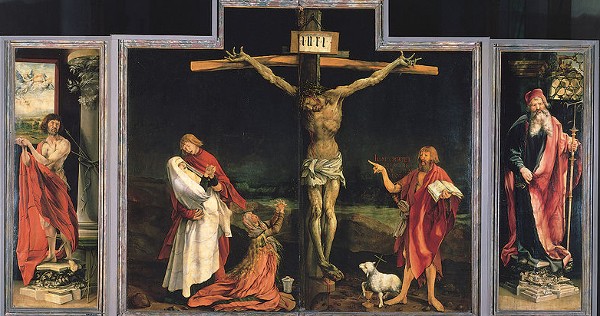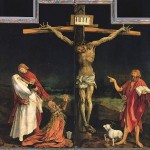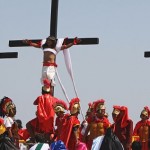 Revelation 16 and the Cross of Christ
Revelation 16 and the Cross of Christ
What if we saw Revelation 16 as applying not just to the enemies of God, whether first-century, present, or future, but saw it as applying to the sacrifice of Christ on the Cross? Such an application can’t account for all of the details of the chapter, but I do believe it provides an immensely profitable way of reading and experiencing the chapter.
It is one thing to think of the seven bowls of God’s wrath in terms of some remote, symbolic judgment of anonymous people in the future, another to think of them in terms of the judgment of God that each of us deserves, and a most miraculous other to think of them in terms of the spotless Lamb of God who came to take away the sins of the world.
Each of the 4 kinds of biblical application to our lives, the literal, allegorical, moral (or tropological), and anagogical interpretations (see Introduction to Give Us This Day), can and should be used to interpret and understand Revelation 16. Today I want us to see the moral (how this applies to me today) and the anagogical (how it applies to Christ) interpretations.
First, and briefly for we must come to Christ today, you should understand that the seven bowls of God’s wrath are not just intended for the wicked nations and individuals of history and not just intended for apostate Israel but also intended for something much more personal and proximate: you! Read over the bowls of judgment, feel and smell the foul and loathsome sore that comes upon men with the mark of the Beast, and recall to your memory that you were once of the kingdom of dark.
See and smell the blood, dead sea and the stinking rotting creation contained therein; see and feel the scorching, relentless sun as it burns you one degree at time; hear the cries of those who gnaw at their tongues because of the plague of darkness that has fallen upon men; see the dragons, hear the beating of offensive wings as they leap upon the earth; and come to the thunderings and lightnings And earthquake of Almighty God as He divides the cities of men and causes their nations to fall, as every island flees away and even the mountains take cover. . .
. . . and remember that all of these plagues, the plagues of Egypt, the plagues of Hell, are your inheritance in the earth. These, and not what you now have, are what you deserve.
But more mysterious still than the fact that these seven bowls of wrath should have come upon you, upon us, is the truth that they fell instead upon the Lamb of God, Jesus Christ, the Son of God!
To begin with, notice Revelation 15:8 (remembering that originally there were no chapter and verse divisions in the Bible): “The temple was filled with smoke from the glory of God and from His power, and no one was able to enter the temple till the seven plagues of the seven angels were completed.” It is as if St. John is saying that no man can enter into the true temple of Heaven until the judgment of God upon man is satisfied. And, indeed, until Jesus Christ propitiated the wrath of God and hung on the Cross and rose from the dead and ascended into Heaven, no man had as of yet entered into Heaven.
On the Cross, Christ suffered every one of these plagues for you. On the Cross, God poured out upon the Son His wrath reserved for man. And so the springs of water become blood (verse 4), and so out of the side of Christ flow both water and blood, and out of his brow He sweated water like blood.
And on the Cross, His kingdom became full of darkness (verse 10), as the disciples fled along with the light and there was darkness over the face of the earth for three hours.
And on the Cross the minions and myrmidons of Pandemonium conspired against the Lord and against His Messiah, saying, “Let us break our bonds in sunder and cast away our cords from us!” This place, Golgotha, the Place of the Skull, is the place where the unclean spirits come out of the mouth of the dragon. This place, Calvary, the Cross of Christ, is the place where Satan has his final fateful encounter with Christ.
And so cursed is Christ who hung upon a tree, who became a curse for us (Galatians 3:13), for He made Him who knew no sin to became sin for us (2 Corinthians 5:21).
Now we know why Christ was in such anguish in Gethsemane. If this is the vision permitted to St. John, how much more must the Son of God Himself seen when He looked into the heavens that Thursday night? He was not just another man being horribly mangled on the Roman cross: He was the sacrificial Lamb of God who took upon Himself the sins and curses of mankind. Now we know why He sweat drops like blood and why He prayed to the Father for the cup to be taken away. What cup? The bowl of God’s wrath, described in Revelation 16. He was given the cup of the wine of fierceness of His wrath (verse 19). How cruel, how wonderful that Christ, knowing what cup He had to drink, offered the cup of salvation and health to His disciples on that same night!
And so when Christ has taken upon Himself the sins of the world and drunk the bowls of wrath for man, a loud voice came out of the temple of heaven, from the throne, crying with Him, “It is finished!” (verse 17.) And at that moment, there was an earthquake (verse 18.)
And so Revelation 16 solves two of my greatest problems in one day. On the one hand, I’m perplexed about what meaning such fantastic literature can have for me today, in my humdrum, trivial round and common task. On the other hand, I wonder how that ordinary, secular life that seems to be too normal to relate to the signs and wonders of the Bible can be shown to me to be a world filled with shock and awe and palpable mysteries beyond compare.
The answer to both my problems is the inspired imagination of St. John who, through the ministry of the Spirit, was shown that behind the façade of this ordinary world is a wonderful, whirling, wheeling world where Good Friday was not just another Roman execution but the battle of Armageddon and where weekly worship on the Lord’s Day is not just another regular event but a recreation of the work of the Lamb of God who drank the cup of woe and took away the sins of the world and offers instead the cup of life to us!
And to me, that’s manifold more miraculous and mesmerizing than some idle speculation about what might come upon the earth long after I have exited it.
Prayer: You are righteous, O Lord,
The One who is and who was and who is to be,
Because You have judged these things.
For they have shed the blood of saints and prophets,
And You have given them blood to drink.
For it is their just due.
You are worthy, O Lambe, to take the scroll,
And to open its seals;
For You were slain,
And have redeemed us to God by Your blood
Out of every tribe and tongue and people and nation,
And have made us kings and priests to our God;
And we shall reign on the earth.
Worthy is the Lamb who was slain
To receive power and riches and wisdom,
And strength and honor and glory and blessing!”
Blessing and honor and glory and power
Be to Him who sits on the throne,
And to the Lamb, forever and ever!
Points for Meditation:
- Meditate today upon the judgment from God that you deserve and the grace that He gives you instead.
- Meditate today upon the sacrifice of Christ for you on the Cross.
- Consider today how you might become more aware to the living miracle of Christ and His sacrifice in your life.
Resolution: I resolve to set aside some time today to become awake to the work of Christ for me and to find one way to appropriately praise or thank Him.
Crucifixion of Christ, Matthias Grunewald – in U.S. Public Domain











